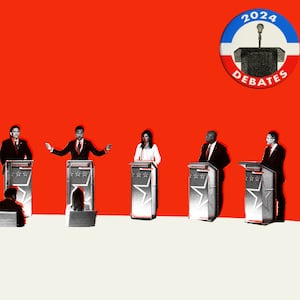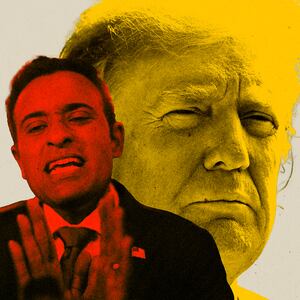Is it time for Republicans to take Nikki Haley seriously?
According to a new Emerson College Polling survey, “Haley saw the largest increase in support among Republican candidates, jumping 5 points from 2 percent to 7 percent” following last week’s debate.
“Nikki Haley’s support increased from about 2 percent to 9 percent among voters over 50 [years of age],” said Spencer Kimball, executive director of Emerson College Polling, “while Trump’s support dropped within this age group from about 56 percent to 49 percent after the debate.”
This jump is modest, inasmuch as it still leaves Haley in the single digits. But it’s also no outlier. According to a poll conducted by The Washington Post, FiveThirtyEight, and Ipsos released last Thursday, voters were persuaded to at least give her a second look. “Pre-debate, 29 percent of GOP primary voters who watched the debate said they were considering voting for her,” according to the survey, “and that increased to 46 percent after the debate.”
So how did she do it? Haley caught our attention by being first to hit Trump (from the right), when she criticized him for “adding eight trillion to our debt.” This surprised everyone, demonstrated courage, and put to rest the notion that she is merely running to be Trump’s vice president.
Haley also staked out a strong position on abortion. While stressing her pro-life beliefs, she made the pragmatic case that a federal abortion ban would require 60 votes. Instead, Haley urged Republicans to focus on consensus issues, like banning late-term abortions, making sure contraception is widely available, and supporting adoption as an alternative.
Trump’s former veep, Mike Pence, who supports a 15-week federal ban on abortion, took umbrage with this. “Nikki, you’re my friend, but consensus is the opposite of leadership,” Pence scolded. (As the Never Trump conservative writer Jonah Goldberg has pointed out on his podcast, building consensus is often a key attribute of leadership.)
This exchange, like others during that same debate, made it clear that in a general election Nikki Haley would likely be Joe Biden’s most challenging opponent.
Having served as governor of South Carolina and ambassador to the United Nations, she has the experience needed for the office. She also has sharp elbows. (“You have no foreign policy experience and it shows,” she told Vivek Ramaswamy.)
At 51, Haley would present a stark contrast in terms of generational change, assuming that Joe Biden was still the Democratic nominee. And (unlike others) she is not staking out an abortion position that might render her effectively unelectable, should she become the Republican nominee.
Haley (who frequently cites Margaret Thatcher’s line, “If you want something said, ask a man. If you want something done, ask a woman”) was the only woman on that stage. Her identity, temperament, and policy positions could help chip away at the gender gap that has only grown in recent years.
The obvious caveat here is that all of these things would make Haley a great candidate to beat Joe Biden if she somehow wins the Republican nomination. But that’s an awfully big “if.”
Haley’s answer to this is to make the electability argument: “We have to face the fact that Trump is the most disliked politician in America,” she—and she, alone—averred during last week’s debate.
But will that dog hunt?
Right now, the electability argument isn’t persuading Republicans to jump off the Trump bandwagon, even though that argument is likely the only one that could ever work. At some point (perhaps after Donald Trump goes on trial and it’s too late), Republicans might be convinced that, as entertaining as Trump is, he simply can’t win.
Based on all of this, you might expect me to suggest that it’s time to clear the field—to rally every freedom conservative, Reagan Republican, and Never Trump conservative to coalesce around Haley as the GOP’s last, best hope.
Some of my colleagues are already there. The New York Times columnist David Brooks, for example, declared last week that “Wednesday’s debate persuaded me that the best Trump alternative is not [Tim] Scott, it’s Nikki Haley.”
But here’s my problem. Haley has been all over the map for years now. One day she’s courageous and impressive, and the next day she’s a pathetic Trump toady.
Haley is a political chameleon, which makes me reluctant to ever trust her again.
On the other hand, anyone looking for purity (as it pertains to Trump) can also dismiss Pence and Chris Christie—both of whom supported Trump until Jan. 6—and a vast swath of today’s leading Never Trumpers. As the Good Book says, “Who then can be saved?”
Nikki Haley’s got a long way to go before she clears the not-Trump lane of candidates, much less taking on the final boss himself. And though nothing has yet made a dent in Trump’s domination of the GOP voter base, he’s never run as a candidate on trial before. But the whole 91-felony indictment thing might just do the trick.
If Haley can prove herself by stringing together two or three of these kinds of courageous performances—in which she not only characterizes Trump as the guy who already lost to Biden, but also that she’s as real a conservative as any of the other contenders—there is a path to success.
It’s hardly guaranteed, and as I’ve noted, courage comes and goes with Haley. But in the “Matt Lewis primary,” you can count me among the 46 percent who are now considering voting for her.









